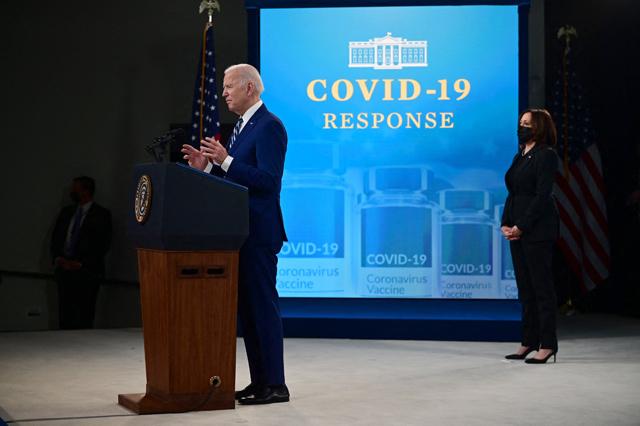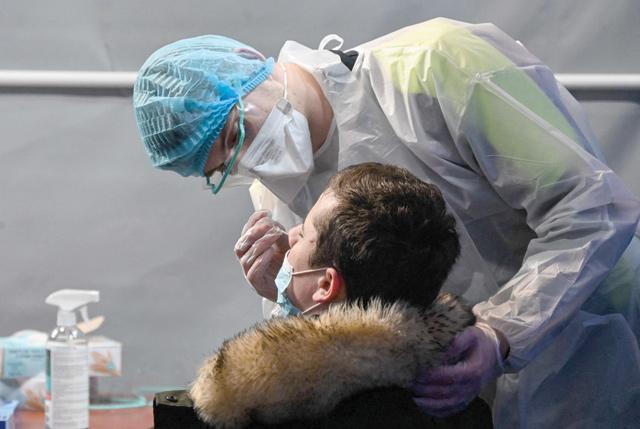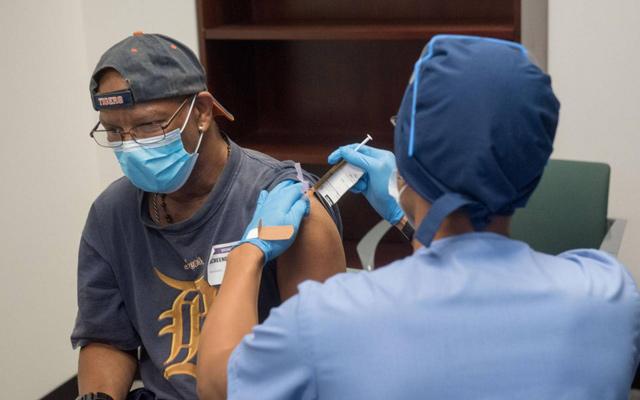You are here
Biden ramps up COVID vaccinations but warns 'war far from won'
By AFP - Mar 29,2021 - Last updated at Mar 29,2021

US President Joe Biden, with Vice President Kamala Harris (right), delivers remarks on Covid-19 response and vaccinations in the South Court Auditorium of the White House in Washington DC, on Tuesday (AFP photo)
WASHINGTON — US President Joe Biden's administration on Monday announced a raft of new actions to expand the national immunisation campaign and ensure that 90 per cent of adults will be eligible for vaccination against the coronavirus by April 19.
But he warned the "the war against COVID-19 is far from won", and blasted people responsible for "reckless behaviour we've seen on television over the past few weeks" that had left the world's worst-hit country on the brink of a fresh surge.
The new vaccination measures include increasing the number of pharmacies participating in a federal immunisation programme from 17,000 to nearly 40,000, while creating a dozen more mass vaccination sites within three weeks.
It also includes $100 million in funding to help vaccinate vulnerable and at-risk older adults and people with disabilities.
The overall goal is to ensure 90 per cent of adults will have a vaccination site within 8 kilometres of where they live.
The moves came after Rochelle Walensky, director of the Centres for Disease Control and Prevention (CDC), highlighted worrying trends in the data that signalled the United States could soon follow Europe into another wave.
The rate of infection in the United States had been plateauing for several weeks, but is now once more on the rise, with the most recent data showing the seven-day average at close to 60,000 new daily cases.
That represents an increase of 10 per cent over the prior seven-day period, while hospitalisations are up to 4,800 per day from 4,600 comparing the same timeframes.
Deaths have risen 3 per cent to around 1,000 per day.
'Impending doom'
"I'm going to reflect on the recurring feeling I have of impending doom," Walensky, a former frontline physician who treated COVID patients earlier on in the pandemic, said in an emotional plea.
"We have so much to look forward to, so much promise and potential of where we are, and so much reason for hope. But right now, I'm scared."
Biden, meanwhile, called on states that have loosened mask mandates and restrictions on businesses to reverse their orders.
"Please, this is not politics. Reinstate the mandate if you let it down," he said, adding it was every American's "patriotic duty" to wear a mask.
Six states have so far lifted mask mandates and several more plan to do so in the first half of April.
American health workers have now administered 143 million shots, and 16 per cent of the population is fully vaccinated, including half of over-65s.
The number of doses injected into arms accounts for some 26 per cent of the world's total, despite the fact the country is only 4 per cent of the global population.
But the US is also by far the most affected country, with close to 550,000 deaths and more than 30 million confirmed cases.
In more positive news, a real-world study by the CDC showed that the Pfizer and Moderna COVID vaccines, both based on new messenger RNA technology, were 90 per cent effective in preventing coronavirus infection — with and without symptoms.
The results came from 4,000 health workers vaccinated between December 2020 and March 2021, and also showed partial vaccination with one dose resulted in 80 per cent protection against infection two weeks after the first shot.
One of the big strengths of the study was that participants self-collected nasal swab tests each week for lab testing, regardless of whether they developed symptoms or not.
This adds to a growing body of evidence that the vaccines halt not just symptomatic disease but infection itself, making them an important tool in stemming the spread of the virus.
The participants included doctors, nurses, first responders and other health care workers from Arizona, Florida, Minnesota, Oregon, Texas and Utah.
The study's authors said they could not make product-specific estimates because of the limited number of infections.
The study is ongoing, and scientists will look to sequence the virus in cases where it was able to infect people despite vaccination, to better understand why this happens in some cases.
Related Articles
WASHINGTON — President Joe Biden ordered flags lowered to half mast Monday after the United States crossed the "heartbreaking" milestone of
WASHINGTON — A decision on whether to end a US pause in vaccinations with the Johnson & Johnson COVID-19 shot is likely by Friday, top U
WASHINGTON — With the Delta variant pushing US COVID cases back up, fully vaccinated people are wondering whether they need to start masking



















